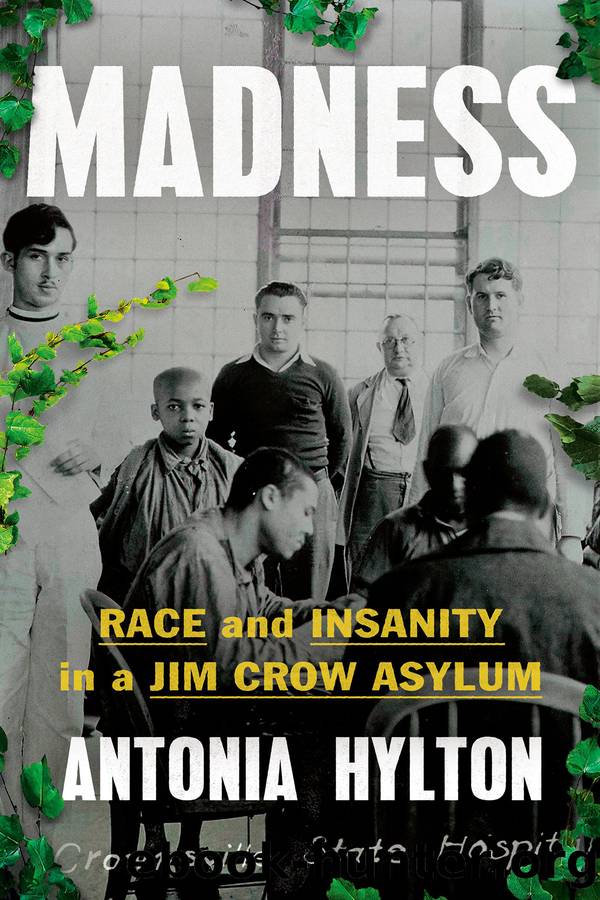Madness by Antonia Hylton

Author:Antonia Hylton [HYLTON, ANTONIA]
Language: eng
Format: epub
Publisher: Grand Central Publishing
Published: 2024-01-23T00:00:00+00:00
Elsie arrived at Crownsville as a small number of Black aides and nurses were starting to get their feet in the door. In most cases, they had come from families just like Elsieâs. They were working to support children and trying to find a way to get along with white colleagues who they knew didnât really want them there. They all wanted something better.
What they likely didnât know at the time was that the field they were entering was trying to rapidly professionalize, even as its leaders and practitioners were scrambling in the dark. Every early development and disease categorization, and every plan for how to treat a child like Elsie, was being touted as a great advancement. In truth, they were treating symptoms, and they knew next to nothing about the origins of mental illness and distress.
That didnât stop the pressure to construct a veneer of competence. Psychiatrists and psychologists across the country started to gather more frequently at conferences and symposiums. Growing numbers opened private practices and started advertising treatments for the anxieties and disturbances affecting the upper classes. Marylandâs health officials began performing mandatory inspections of every asylum, and set statewide goals to match the professional recommendations from national organizations like the American Psychiatric Association (APA).
In the midst of this push, in the fall of 1954, the APA notified Superintendent Arnold Eichert that Crownsville failed to meet basic standards and would not be approved for accreditation. The APA echoed what patients and their families had been saying for years: Crownsville was severely overcrowded and understaffed.
The APA made their decision after extensive tours of Crownsvilleâs facilities, interviews with staff, and supervision of their services. Unsurprisingly, inspectors found wards brimming with untreated patients and foul bathrooms. Before they could reach accreditation, Crownsville would have to embrace the techniques and therapies that doctors were implementing in other, majority-white hospitals. The APA recommended that Crownsville establish specialized departments, create formal residency and training programs, and perform medical research through ties to nearby universities.
Caught up in the pressure, staff at Crownsville desperately wanted to serve a solution to chronic problems. They saw that many of the treatments were risky, sure, but they believed trying something was better than nothing at all. And sometimes, they did produce improvementsârecoveries, even.
Between 1952 and 1960, a flurry of studies involving Crownsville patients are mentioned in the records, although I was never able to find any summaries or conclusions of their findings. When I asked Paul Lurz and his friend Rob Schoeberlein, a current Maryland state archivist, why these records didnât exist, they suspected that nobody had been required to keep them, though they may have been captured as papers submitted and published in the medical journals of the era. I have not been able to find them. âThe great 1950s push for research in mental hospitals involved numerous human rights violations,â Paul wrote to me. At the time he arrived in the 1960s, staff were sometimes still offering patients cigarettes and candies in exchange for trying out new drugs.
Download
This site does not store any files on its server. We only index and link to content provided by other sites. Please contact the content providers to delete copyright contents if any and email us, we'll remove relevant links or contents immediately.
| General | Discrimination & Racism |
Nudge - Improving Decisions about Health, Wealth, and Happiness by Thaler Sunstein(6644)
iGen by Jean M. Twenge(4708)
The Fire Next Time by James Baldwin(4352)
Adulting by Kelly Williams Brown(3682)
The Sports Rules Book by Human Kinetics(3597)
The Hacking of the American Mind by Robert H. Lustig(3589)
The Ethical Slut by Janet W. Hardy(3513)
Captivate by Vanessa Van Edwards(3310)
Mummy Knew by Lisa James(3176)
In a Sunburned Country by Bill Bryson(2954)
The Worm at the Core by Sheldon Solomon(2929)
Ants Among Elephants by Sujatha Gidla(2929)
Suicide: A Study in Sociology by Emile Durkheim(2617)
The Slow Fix: Solve Problems, Work Smarter, and Live Better In a World Addicted to Speed by Carl Honore(2579)
Humans of New York by Brandon Stanton(2383)
Handbook of Forensic Sociology and Psychology by Stephen J. Morewitz & Mark L. Goldstein(2380)
Blackwell Companion to Sociology, The by Judith R. Blau(2320)
The Happy Hooker by Xaviera Hollander(2277)
Outliers by Malcolm Gladwell(2263)
